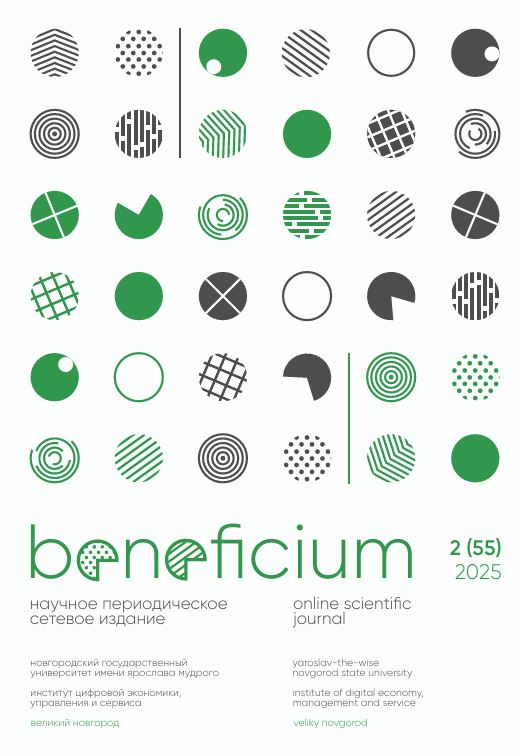ACCOUNTING RULES FOR ZAKAT AND DISCLOSURE OF ZAKAT IN FINANCIAL STATEMENTS OF ISLAMIC BANKS AND FINANCIAL INSTITUTIONS
Abstract
This article provides a detailed analysis of Standard No. 9, developed and published by the Accounting and Auditing Organization for Islamic Financial Institutions (AAOIFI), headquartered in Bahrain. This standard plays a key role in the development of Islamic finance in Russia. Understanding and applying AAOIFI standards, especially in the area of governance, is essential for the successful implementation of Islamic financial instruments in the Russian market. The presented translation is the first professional translation into Russian of AAOIFI standards on the governance of Islamic financial institutions, which is an important stage for the development of the sector. Interest in Islamic finance in Russia, especially in regions with a Muslim population, is growing, since many residents of these regions have limited access to traditional banking services due to religious beliefs. Islamic finance based on the principles of Sharia offers an alternative. The presence of potential demand is an argument for expanding the supply. However, widespread implementation requires the creation of an effective Sharia control system that guarantees compliance of transactions with the principles of Islam. Developing such a system is a complex task that requires the involvement of experts in the field of finance and Sharia. AAOIFI Standard No. 9, discussed in this article, is an important step, offering international practices in the field of accounting and management of Islamic financial institutions. Understanding this standard is necessary for the development of Islamic finance in the country.
Keywords: Zakat, invested assets method, net asset method, Zakat valuation methods, accounting rules, Sharia accounting standards, financial statements of Islamic financial institutions
References
- Harisova F.I., Derzayeva G.G., Tukhvatullin R.SH., Aletkin P.A. Corporate Social Responsibility as a Principle of ESG in the Light of the Federal Law on Partner Financing // Kazan Economic Vestnik. 2023. Vol. 3(65). Pp. 80-88. (In Russ.).
- Umarov Kh.S. Ethical Constituents of Accounting Data in Islamic Financial Institutions // International Accounting. 2019. Vol. 22(8-458). Pp. 921-929. (In Russ.). DOI: 10.24891/ia.22.8.921
- Shulthoni M., Saad N.M. Waqf Fundraising Management: a Conceptual Comparison between Traditional and Modern Methods in the Waqf Institutions // Indonesian Journal of Islam and Muslim Societies. Vol. 8(1). Pp. 57-86. DOI: 10.18326/ijims.v8i1.57-86
- Aishah Mohd Ali N., Shahimi Sh., Shafii Z. Knowledge, Skills and Characteristics Requirements for Shari’ah Auditors // Asian Journal of Accounting and Governance. 2018. Vol. 9. Pp. 171-185. DOI:10.17576/AJAG-2018-09-15
- AAOIFI, Accounting, Auditing and Governance Standards for Islamic Financial Institutions. Manama, Bahrain: AAOIFI, 1437 A.H., 2015. Pp. 926-927.
- Zakaria N., Mohd Ariffin N., Hafizah Zainal Abidin N. Internal Shariah Audit Effectiveness and its Determinants: Case of Islamic Financial Institutions in Malaysia // Kyoto Bulletin of Islamic Area Studies. 2019. Vol. Pp. 8-28.
- Umarov Kh.S. Role of an Ethical Component in the Review of Approaches and Methods to the Organization of Creative Accounting in World Practice // Innovation and Investment. 2018. Vol. 8. Pp. 231-234. (In Russ.).
- Umar U.H., Kurawa J.M. Business Succession from Islamic an Accounting Perspective // ISRA International Journal of Islamic Finance. 2019. Vol. 11(2). Pp. 267-281. DOI: 10.1108/IJIF-06-2018-0059
- Derzayeva G.G. Accounting policy of Construction Companies in Accordance with International Financial Reporting Standards // IOP Conference Series: Materials Science and Engineering. 2020. Vol. 945(1). Pp. 1-8. DOI:1088/1757-899X/945/1/012009
- Umarov Kh.S. Regulation of the islamic Accounting Model in the Context of Russian Reality // Auditor. 2021. Vol. 7(6). Pp. 30-40. (In Russ.).
- Mohammed N.F., Mohd Fahmi F., Ahmad A.E. The need for Islamic accounting standards: The Malaysian Islamic financial institutions experience // Journal of Islamic Accounting and Business Research. 2019. Vol.10(1). Рp. 115-133. DOI: 10.1108/JIABR-12-2015-0059
- Dmitrieva I.M., Kharakoz Yu.K. Features of the Islamic Accounting Model // Auditor. 2021. Vol. 7(5). Pp. 41-45. (In Russ.). DOI: 10.12737/1998-0701-2021-7-5-41-45
- Kharisova F.I., Iskhakova G.M., Yusupova A.R., Kharisov I.K. Formation of Financial Statements at Islamic Financial Institutions // The Journal of Social Sciences Research. 2018. Vol. S5. Pp. 128-132. DOI: 32861/jssr.spi5.128.132
- Voronova E.Y., Umarov H.S. Islamic (Partner) Accounting and its Comparison with International Financial Accounting Standards (IFRS) // Universal Journal of Accounting and Finance. 2021. Vol.9(2). Рp. 267-274. DOI: 13189/UJAF.2021.090217
- Kharisova F.I., Yusupova A.R., Kharisov I.K. General Characteristics of Accounting Standards for Islamic Financial Institutions // International Accounting. 2018. Vol. 21(2-440). Pp. 138-148. (In Russ.). DOI: 10.24891/ia.21.2.138
About the Author
Gulia M. Iskhakova – Senior lecturer, Kazan Federal University, Kazan, Russia. E-mail: Gulia1201@yandex.ru. SPIN РИНЦ 1239-5674. ORCID 0000-0002-8586-2624. Researcher ID AAE-9885-2022. Scopus Author ID 57195955478
For citation: Iskhakova G.M. Accounting Rules for Zakat and Disclosure of Zakat in Financial Statements of Islamic Banks and Financial Institutions // Beneficium. 2025. Vol. 2(55). Pp. 9-18. (In Russ.). DOI: 10.34680/BENEFICIUM.2025.2(55).9-18









